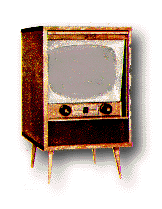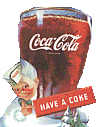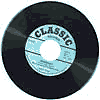Entertainment
Fess Parker captured the hearts of millions with his strong, confident portrayal of the legendary king of the wild frontier.
The popular action-adventure inspired millions of children to sport coonskin caps and sing "The Ballad of Davy Crockett," which topped the nation's hit list for 13 weeks!

Eisenhower, Dwight David
1890-1969, American general and 34th president of the U.S. (1953-61); A West Point graduate, he had a meteoric rise as a military commander during World War Ii. In 1942 he became chief of army operations in Washington, D.C. Later that year he was named U.S. commander of the European theater of operations, and in 1943 he became supreme commander of the Allied Expeditionary Force. Eisenhower coordinated and directed the Allied invasion of Europe in June 1944. In Dec. 1944 he was made general of the army (five-star general) and upon his return to the U.S. became army chief of staff (1945-48). He was president of Columbia Univ. from 1948 to 1950 and in 1950 was named supreme commander of the Allied forces in Europe. After organizing the defense forces of the North Atlantic Treaty Organization (NATO), Eisenhower resigned (1952) from the army to campaign for the Republican presidential nomination. Popularity as a World War II hero brought him an easy election victory over his Democratic opponent, Adlai E. Stevenson. One of Eisenhower's first moves as president (July 1953) was to fulfill a campaign promise to end the Korean War. He and his secretary of state, John Foster Dulles, continued the Truman administration's policy of containing Communism, but attempts were also made to ease cold-war tensions. In domestic affairs, Eisenhower remained aloof from the legislative process and took few initiatives. Despite a heart attack (1955) he easily won reelection in 1956. His administration then took a more active role in the growing Civil-rights movement. In 1957 he sent federal troops to Little Rock, Ark., to enforce a court-ordered school desegregation decision, and later Congress enacted federal civil-rights legislation. Also in 1957, the president promulgated the so-called Eisenhower doctrine, which committed the U.S. to an active role in the Middle East to protect the region from Communist aggression. Tensions with the Soviet Union increased, however, and a summit meeting (1960) with Nikita Khrushchev ended abruptly because of conflict over U.S. espionage flights over the USSR. In 1959 the coming to power of the Communist Fidel Castro in Cuba posed other problems, and Eisenhower broke diplomatic relations with Cuba just before leaving office in Jan. 1961.
 |
Culture
1. Throughout the decade, the U.S. enjoyed a swelling prosperity.
2.Americans developed a nervousness about international events and a fierce national pride. These feelings were reflected in the anti-Communist movement in the United States that came to be known as
McCarthyism.
3. America returns to traditional lifestyles and the idea of common decency. Church attendance rose, and any behavior that could be considered subversive was repressed by social censure and, occasionally, by the courts.
4. Automobiles became commonplace as the country grew prosperous, and highways, tunnels and bridges sprang up across the United States, making far-flung travel possible for middle-class Americans. Labor-saving appliances went from luxuries to everyday items. Perhaps the greatest changes in American life, however, resulted from the growth of television as a national medium. Political events were televised, popular programming entertained the country, and perhaps most influentially, advertisers piped their alluring images into thousands of American homes.
McCarthy
In February of 1950, Senator Joseph McCarthy, a Republican from Wisconsin, made an astounding accusation: many employees of the U.S. State Department were card-carrying Communists, loyal only to the Soviet Union. His claims created a national furor. In the following years, McCarthy would expand his accusations to include high-ranking officials of the U.S. Army and even President Eisenhower. Although his accusations ruined many careers, McCarthy was unable to provide any proof to substantiate them. In 1954, Senator McCarthy held televised hearings in which his charges become so outrageous that the Senate voted to censure him. His hold on the public mind became weaker in the years until his death in 1957, but the seeds of anti-Communism were planted deep in American culture.
The American fear of Communism was not completely irrational. The Soviet Union and its allies made little attempt to hide their efforts to expand Communism's hold on the world. The creeping borders of the Soviet empire made many nations anxious in the West and elsewhere. At the same time, a number of spies in America and England were exposed during the 1950s in highly publicized trials. Alger Hiss, a former State Department official, was accused of spying for the communists in 1948 and convicted of perjury in 1950. Also in 1950, physicist Klaus Fuchs, who helped to create the atomic bomb, was convicted of passing British atomic secrets to the Soviets. These sensations were followed by the spying convictions of Ethel and Julius Rosenberg in 1951 and Jack and Myra Soble in 1957, among others. These revelations made many Americans feel that there were Communists around every corner, and this fear led to widespread abuses.
|
The Cold War
During World War II, the United States and the Soviet Union were uneasy allies. At the close of the war, their differences immediately began to drive the two superpowers apart. Countries liberated from Nazi occupation were divided like the spoils of war. In western Europe, the Allied powers permitted the conventional government of each country to reestablish itself. In the countries of eastern Europe, the Soviets installed leftist governments, creating a legacy of communism. This division was most starkly displayed in Germany itself; the country was divided in half, and its capital city, Berlin, was split in two. Capitalist and communist ways of life regarded each other coldly across a dividing line that would become a fortified wall.
The term "Cold War" was first used to describe the fierce rivalry that arose between the United States and the Soviet Union in 1947. During the 1950s, this war was fought in several arenas. The Korean War, a conflict between Communist North Korea and democratic South Korea, was a thinly veiled contest between the two global superpowers, pitting the United States against Communist China, a Russian ally. A similar puppet conflict threatened in the Middle East in 1956, when the U.S. and the U.S.S.R. interceded in the Second Arab Israeli War.
Cold War tensions eased somewhat in 1953 with the death of Josef Stalin, longtime Soviet dictator. Stalin was succeeded by a series of Soviet premiers whose ideologies varied but whose attitudes toward the United States remained hostile. Nikita Kruschev, who terrified Americans with the proclamation, "We will bury you!" stood at or near the pinnacle of the Soviet state from 1953 to 1964. Under his leadership, the Soviet Union devoted prodigious energies to the arms race with the West.
In 1953 the Soviet Union detonated a hydrogen bomb, only a year behind the United States. In 1957, the Soviet Union pulled ahead of the United States by launching Sputnik I, the first artificial satellite. While the American space program achieved many notable feats during the 1950s, the Soviets maintained a commanding lead, landing the first probe on the moon in 1959 and sending the first probe around the moon in the same year.
The space race had a menacing double-meaning: the rocket technologies it developed were being used by both superpowers to develop intercontinental ballistic missiles, which could deliver nuclear weapons around the world. At the same time, the demonstration of technological power had powerful propaganda value. Throughout the 1950s, Americans became increasingly fearful of the apparent superiority of Soviet technology, and the rising specter of nuclear war. Bomb shelters proliferated in the U.S. As the fifties rolled to a close, Cold War tensions were rising to a new peak.

Back to Golden age- tv 50's-60's |










